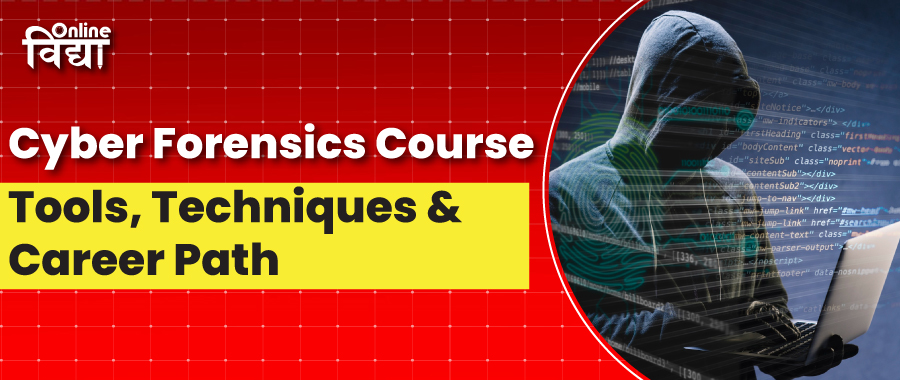Specializations
Courses Available
Courses

Cyber Forensic Courses: Tools, Techniques, & Career Path
Cyber Forensic Courses: Tools, Techniques, & Career Path,May 03, 2025
Information
May 03, 2025
1359 Views
- Share:
Cyber Forensic Science: What does it mean?
Cyber forensic science comprises the evidence collected, analyzed, proved, summarized, and served digitally for investigation regarding computers. It refers to the hard drive or to erased material that may carry evidence. It analyzes and collects material from a system or device and translates it into documents for presentation in court.
The making of a soft or digital portrait of the unique storage cell of the system is necessary to investigate it. The cause of the security vulnerability was found as a result of a thorough cyber forensics study. All this is done without compromising the system on the software copy.
What are the differences between cybersecurity and digital forensics?
Cybersecurity constitutes the protection of computer systems, networks, and all technologies through the preservation of the operating conditions of such systems from all jeopardy or malice or threat upon cyber attack, while digital forensic science acts upon the recovery and analysis of those artifacts found on a digital device.
The range of the cyber forensic analysis
Its extension will continue to embrace the area for all things going digital. It is a strong weapon to hit the underlying culprits. Cyber forensic experts are trained to track hackers and crackers through an intelligent investigation.
The volume of cyber forensic matters increases due to the increasing rate of cybercrime in which experts play a major role. According to the projections of NCRB, cybercrime doubled between 2016 and 2018, and this figure is expected to increase as much as four times more than this figure. This shows how valuable the police are in cracking cybercrimes and the number of cyber forensics matters that experts need to handle.
With the help of cyber forensics, one can digitally enter any crime scene, such as checking email logs, browser histories, or even digital footprints.
Appliances used in cyber forensics
Now, let us study more about the appliances used in conducting cyber forensics.
Evidence Collection: Cyber forensic specialists access digital evidence from various sources like PCs, servers, or mobiles, such as from network logs. The process also ensures the integrity of the evidence for admissibility in court.
Data recovery: Deleted or corrupt data can sometimes be recovered using specific tools and techniques. This creates the basis for reconstructing events and determining culprits.
Network analysis: Network analysis facilitates the identification of vulnerabilities, understanding of attack patterns, and tracing intrusion incidents based on the analysis of network traffic and logs.
Malware Analysis: Malware analysis by cyber forensic specialists reaps knowledge about its behavior in a system, its learning mode, and the process of infection, which aids further in attribution as well as designing countermeasures.
Cyber Forensics Tools
Some of the tools that are used in investigating cyber forensics are discussed below:
Data-collection tools
Apart from this, data capture systems ensure automated assistance for data collection, reporting, forensic analysis, answering questions, randomization, and authentication.
File Viewers
File viewer refers to a software application that precisely displays data stored in a file. The file viewer is different from a file editor in that it only renders the content visible to the user in a read-only fashion.
File Analysis Tools
File analysis tools are designed to assist cyber experts in understanding an organization's file structure. Those tools index, search, track, and analyze key information in the file.
Internet Analysis Tools
One of the best traffic information monitoring and analysis tools available for free to website owners is Google Analytics.
Career Path in Cyber Forensics
The elevation of cyber forensics should be extended to more and more cases of cyberattacks. Cyberterrorism not only affects an organization but also adversely affects people's lives through the online sale of drugs, financing of terrorism, etc. Therefore, these crimes need to be fought against. For cyber forensic experts, both in India and the world at large, employability opportunities are endless.
PayScale says salaries in India for cyber forensic specialists vary from INR 4 lakh to INR 8 lakh in one year.
Cyber forensics is the science of acquiring, analyzing, examining, summarizing, and presenting electronic evidence concerning computers. It helps in counter-hostile activities in identifying the source offenders. Cyber forensics has been set up to counter the rapidly growing trend of cyberattacks.
FAQs
What are the Careers in Cyber Forensics?
The purpose of this career is to reduce threats and vulnerabilities in systems and networks; therefore, this is the prosecution of incidents that involve the collection of digital evidence and computer security incidents. Such workers are sometimes informally called computer forensics analysts. Computer Network Defense (CND) Forensic Analyst.
How in Demand are Cyber Forensics?
The Bureau of Labor Statistics (BLS) shows that the job prospects for information security analysts, a pretty normal job category for digital forensic investigations, are expected to grow much faster than average. This will be at the rate of about 14 percent from 2023 to 2033.
What is Cyber Forensics All About?
Some of the criminal acts investigated by cyber forensics include hacking, virus attacks, data breaches, online fraud, IP theft, cyberbullying, and digital identity theft.

Meet Our Counselling Experts
Get 100% Free Career Counseling




PlacementPartners










Schedule Your 30 min Couselling Session With Today!!
Select a Date of your choice :
You Have Selected Slot on .

